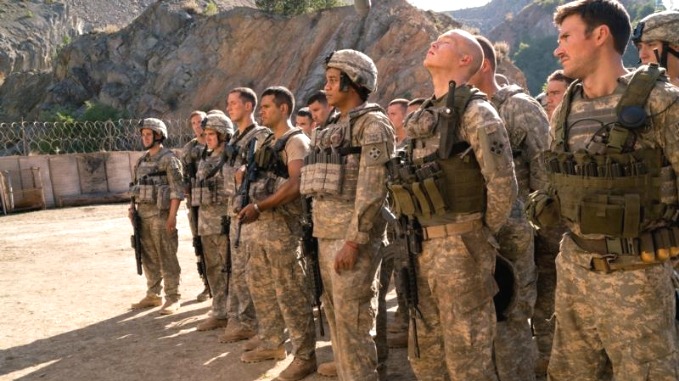
With a commendable sensitivity to both the inanities and the unrelenting raw horror of combat — and careful attention to the emotional lives and steadfast valor of soldiers — “The Outpost” (Screen Media) seems likely to become an instant classic of the war-film genre.
Based on the 2012 book by CNN correspondent Jake Tapper, it’s an account of the Battle of Kamdesh in Afghanistan Oct. 3, 2009, when 300 Taliban fighters overran the remote Combat Outpost Keating, at which 53 Americans were based. Eight were killed and another 27 wounded, while half the Taliban died.
The fighting brought Medals of Honor for Staff Sgt. Clint Romesha (Scott Eastwood) and Specialist Sgt. Ty Carter (Caleb Landry Jones), members of the 61st Cavalry Regiment of the 4th Infantry Division.
Director Rod Lurie, working from a screenplay adapted by Paul Tamasy and Eric Johnson, is particularly adept at limning tiny, telling non-sequitur conversations, such as Carter’s explanation to an unseen interlocutor: “Jesus was a pacifist, sergeant.”
Real life comes without plots and death arrives without warning, so Lurie — before the attack occurs — lingers on one soldier’s emotional turmoil after his comrade is blown off a footbridge. No one uses the term “unit cohesion,” but it’s exhibited throughout. Training, discipline and compassion keep everyone alive.
But the old cliches of war films persist. So Lurie allows audience-pleasing wisecracks — including Romesha’s after air support arrives to dispense with a dozen Taliban: “Thank you for your service, man.”
The verisimilitude here extends to language, making this unfit viewing for youngsters. There’s also a brief scene in which the soldiers, long accustomed to improvising physical challenges, pass the time by waterboarding one another as an endurance test.
The bravery of the Americans becomes apparent as the film, through dialogue, explains that the base, situated beneath three mountains a few miles from the border with Pakistan, is both non-strategic and essentially impossible to defend.
Some context is only alluded to — for instance, that the Army had directed resources to reinforce other units rather than this outpost. One soldier is heard to quip in frustration, “Someone should tell (Gen. Stanley) McChrystal we’re not out here selling Popsicles!”
The soldiers aren’t even sure why they’re there. Relations with the locals are hobbled by perpetual negotiations and suspicion, although religious differences aren’t shown to be much of a factor since, by this time, the Afghans have been dealing with invaders for 30 years.
First Lt. Benjamin Keating (Orlando Bloom) finally gets the orders to close the base. But before a heavy truck can be moved out, the attack, which takes up the entire second hour of the movie, begins.
The plot doesn’t delve into the morality of war or the decisions that have placed American soldiers in peril in Afghanistan for nearly 20 years. Rather, the focus stays on the interdependence that has all looking after one another like brothers.
It’s an elegant form of inspiration that doesn’t require speeches or flag-waving.
The film contains combat violence with some gore, a discussion of suicide, occasional sexual banter, fleeting profanities and pervasive rough and crass language. The Catholic News Service classification is A-III — adults. The Motion Picture Association rating is R — restricted. Under 17 requires accompanying parent or adult guardian.
By Kurt Jensen
